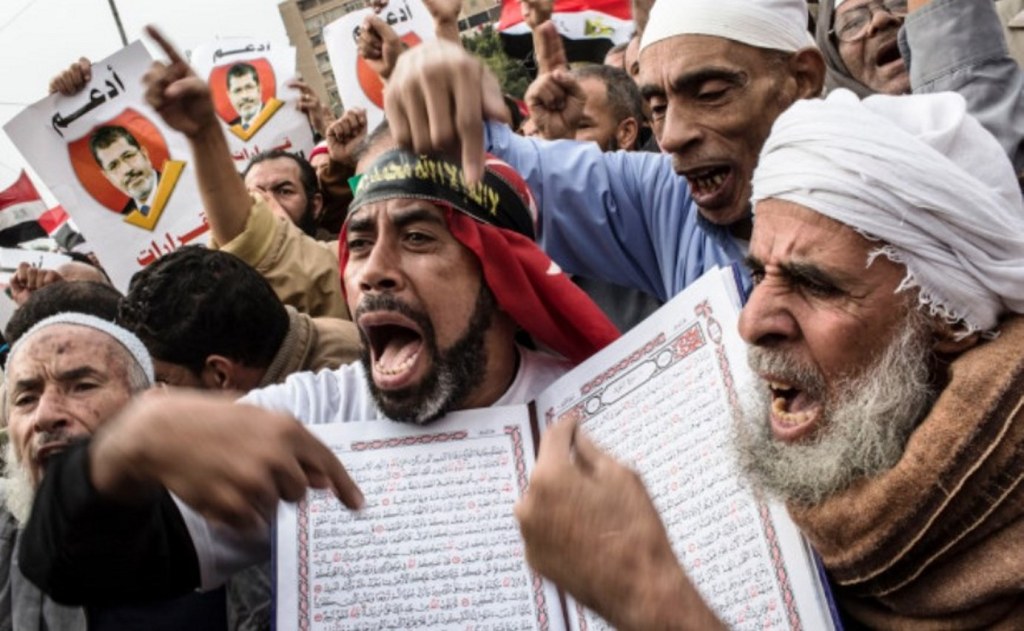Europe: The New Political Weapon of ‘Islamophobia’
الين دستكسي: أوروبا وسلاح جديد هو الإسلاموفيوبيا
Alain Destexhe/Gatestone Institute/November 14/2019
Muslim Brotherhood Subversion vs. Jihadist Rage
ريموند إبراهيم: تخريب الإخوان المسلمين مقابل الغضب الجهادي
Raymond Ibrahim/FrontPage Magazine/November 14/2019
What do Abu Bakr al-Baghdadi, Osama bin Laden and Ayman al-Zawahiri—that is, the late leader of ISIS, and the late and current leaders of al-Qaeda—have in common? That they’re among the world’s most notorious Islamic terrorists? Yes, but there’s something else, something more subtle, that binds them: they all began their careers as members of the Muslim Brotherhood, the oldest and most widespread political Islamic organization in the world.
In a 2014 video interview, Sheikh Yusuf al-Qaradawi—a spiritual leader of the Brotherhood whose Al Jazeera program on shari‘a is watched by tens of millions of Muslims—asserted that “this youth [al-Baghdadi] was from the start among the top ranks of the Brotherhood, but he was inclined to [positions of] leadership and so forth… Then, after he spent years in prison [for Brotherhood activities] he came out and joined with them [the nascent Islamic State],” eventually becoming first “caliph.” (I first discussed this Qaradawi video soon after it appeared in 2014; predictably, YouTube has since taken it down, though Arabic websites still have it.)
In response, Egyptian Minister of Religious Endowments (awqaf), Dr. Muhammad Mukhtar Gom‘a had said that “Qaradawi’s confession [concerning al-Baghdadi] confirms that the Brotherhood is the spiritual father to every extremist group.”
So it would seem: In a 2012 video, Ayman al-Zawahiri, current leader of al-Qaeda, said of his friend and predecessor that “Sheikh Osama bin Laden was a member of the Muslim Brotherhood in the Arabian Peninsula,” during his youth and in the 1980s.
As for al-Zawahiri himself, his involvement with the Brotherhood in Egypt, where it was founded in 1928, is especially well known. Indeed, he wrote an entire book about it, The Bitter Harvest: The [Muslim] Brotherhood in Sixty Years (which first surfaced around 1991; translated portions appear in The Al Qaeda Reader). The book is dedicated to demonstrating how and why the Brotherhood had lost its way by choosing to participate in elections instead of waging jihad against the “apostate” government of Egypt.
What’s noteworthy here is that al-Baghdadi, bin Laden, and al-Zawahiri all agreed with the overall vision of the Muslim Brotherhood—unsurprisingly so, considering the latter’s motto is “Allah is our objective. The Prophet is our leader. The Koran is our law. Jihad is our way. Dying in the way of Allah is our highest hope.”
What the three jihadist leaders had grown frustrated with is the Brotherhood’s patient and nonviolent approach—its willingness to compromise Islam (including jihad) in order to “play the game,” as it were. Consider what al-Zawahiri, who had joined the Brotherhood when only fourteen years old, before abandoning it for more militant groups, wrote in Bitter Harvest:
[N]ot only have the Brothers been idle from fulfilling their duty of [waging] jihad, but they have gone as far as to describe the infidel governments as legitimate, and have joined ranks with them in the jahiliyya [infidel-style of] governing, that is, democracies, elections, and parliaments. Moreover, they take advantage of the Muslim youths’ fervor by bringing them into their fold only to store them in a refrigerator. Then, they steer their onetime passionate Islamic zeal for jihad against tyranny toward conferences and elections.
Interestingly, when all is said and done, the Brotherhood’s patient and incremental methodology has proven far more effective than the outright jihad of its terroristic offshoots. Despite Zawahiri’s grumblings from the early 1990s, and after decades of grassroots efforts, the previously banned Brotherhood won Egypt’s 2012 elections, with one of its members, the late Muhammad Morsi, becoming the nation’s first democratically elected president.
Of course, a year later Egypt revolted against the Brotherhood, which found itself again labeled a terrorist organization. Even so, the Brotherhood remains alive and well, particularly in the United States of America. According to a 1991 Muslim Brotherhood document written in Arabic and presented as evidence in the 2008 Holy Land Terror Funding Trial, the Brotherhood’s purpose in America is to wage a soft and subversive jihad of attrition; in the Brotherhood’s own words:
The process of settlement is a “Civilization-Jihadist Process” with all the word means. The Ikhwan [members of the Muslim Brotherhood] must understand that their work in America is a kind of grand jihad in eliminating and destroying the Western civilization from within and “sabotaging” its miserable house by their hands and the hands of the believers.
Towards the end of the document, “A list of our organizations and the organizations of our friends” appears and includes the Council on American-Islamic Relations (CAIR), the Islamic Society of North America (ISNA), and the Islamic Circle of North America (ICNA).
All of these Brotherhood front groups remain alive, well, and highly influential in America—and therefore pose a greater long term and subversive threat for the security of the United States than ISIS, al-Qaeda, or any other jihadi organization.
Europe: The New Political Weapon of ‘Islamophobia’
الين دستكسي: أوروبا واستعمل سلاح جديد هو الإسلاموفيوبيا
Alain Destexhe/Gatestone Institute/November 14/2019
The objective of using the word “Islamophobia” appears to have been to make Islam untouchable by placing any criticism of it as equivalent to racism or anti-Semitism.
The word “Islamophobia” deliberately intends to transform the critique of a religion — a fundamental right in Western societies — into a crime.
“The term ‘Islamophobia’ serves several functions….Above all, however, the term is intended to silence Muslims who question the Koran, who demand equality of the sexes, who claim the right to renounce their religion, and who want to practice their faith freely and without submitting to the dictates of the bearded and dogmatic.” – Pascal Bruckner, in his book, Un racisme ordinaire : Islamophobie et culpabilité, Grasset, 2017 [English version: An Imaginary Racism: Islamophbia and Guilt, Polity 2018]
It is not Muslims people “hate,” any more than they hate Hindus or Buddhists or Shintos. It is the violence and coercion that some adopt — what is known as jihad or holy war — that people reject.
In the attacks at the Bataclan Theater and other sites in 2015, terrorists murdered 131 persons and wounded 413. Is it irrational to remember who was calling those shots?
As noted by the journalist Stéphane Charbonnier, murdered in the Charlie Hebdo attack in 2015, Islamophobia “is not only a poorly chosen word but also a dangerous one.” (Image source: Arzu Çakır/VOA/Wikimedia Commons)
France is once again profoundly divided over Islam. Last Sunday, November 10, a “March against Islamophobia” was held in Paris in response to an appeal from 50 public figures. In an op-ed in the leftist newspaper Libération, the demonstrators pleaded to “stop Islamophobia and stop the growing stigmatization of Muslims, victims of discrimination and aggression”.
Two recent incidents ignited the public debate and served as a pretext for the march. On October 26, an 84-year-old man shot and injured two men while trying to set fire to the mosque of Bayonne. Earlier in October, in the Regional Assembly of Burgundy, a member of the National Rally party (RN) complained about the presence in the gallery of a woman wearing an Islamic headscarf. The French political class and media condemned both incidents almost unanimously.
Among the signatories of the op-ed are Jean-Luc Mélenchon, president of La France Insoumise (“Unsubmissive France”), the most prominent leftist political party in the French National Assembly; Benoît Hamon, the Socialist Party candidate in the last presidential election; Philippe Martinez, leader of the Communist trade-union General Confederation of Labor (CGT); Yannick Jadot, a prominent Member of European Parliament from the Green party and Edwy Plenel, editor of Mediapart, a successful online media news platform and former editor of the newspaper Le Monde.
The op-ed sparked a national debate. How could these established public figures sign a text alongside known Islamist sympathizers, such as Nader Abou Anas, an imam who believes that “women can only go out with the permission of their husband”, or Marwan Muhammad, the former CEO of the Collective against Islamophobia in France (CCIF) — an organization suspected of links with the Muslim Brotherhood — who compared the situation of Muslims in France today with those of the Jews in Germany in the 1930s, going so far as to add that “in France, mosques are machine-gunned” (“mitraillé”)?
The debate was particularly tense within the Left. Historically, the Left in France was always a powerful advocate of secularism (“laïcité” in French; a strong separation between church and state). However, a portion of the Left now chooses to support multiculturalism and so-called “identity politics” and to ally itself with Islamists whose agenda opposes having a secular state. The alliance between the traditional Left and Islamists is often described as “Islamo-gauchisme” (“Islamo-leftism”). The controversy became so great that some of the signatories even decided to abstain from participating in the demonstration.
The choice of the word “Islamophobia” as the central rallying call was, of course, not neutral. As noted by the journalist Stéphane Charbonnier, murdered in the Charlie Hebdo attack in 2015, in his posthumous book[1], Islamophobia “is not only a poorly chosen word but also a dangerous one.”
Historically, the word Islamophobia — coined in the 1910s by a French colonial administrator[2] — was rarely used until the 1990s. After Iran’s 1979 Islamic Revolution, particularly after Ayatollah Khomeini’s fatwa against Salman Rushdie following the publication of The Satanic Verses, the term became used as a political weapon.[3] The objective appears to have been to make Islam untouchable by placing any criticism of it as equivalent to racism or anti-Semitism.
The word “Islamophobia” deliberately intends to transform the critique of a religion — a fundamental right in Western societies — into a crime.
Pascal Bruckner, a French philosopher, suggested the role played by the concept. According to him:
“The term ‘Islamophobia’ serves several functions. It denies the reality of an Islamic offensive in Europe all the better to justify it. It attacks secularism by equating it with fundamentalism. Above all, however, the term is intended to silence Muslims who question the Koran, who demand equality of the sexes, who claim the right to renounce their religion, and who want to practice their faith freely and without submitting to the dictates of the bearded and dogmatic.”[4]
Unfortunately, many media outlets and human rights groups fell directly into the trap and often use the word “Islamophobia” despite its lack of any legal basis or precise definition. Every time the word is used, it is a small victory for the Islamists.
A phobia is an extreme irrational fear or an aversion to something. Why, however, is it irrational to be afraid of Islam when terrorists murder, and call for murder, in the name of their God? — even if the perpetrators are but a small minority among Muslims. Forty years ago, who could have imagined that terrorist attacks could be perpetrated in the United States or Europe in the name of a religion? In this context, being “Islamophobic” (being afraid of a religion) is not a crime. And it is light years’ different from “hating” Muslims “for being Muslims”. It is not Muslims people “hate,” any more than they hate Hindus or Buddhists or Shintos. It is the violence and coercion that some adopt — what is known as jihad or holy war — that people reject.
The signatories were also severely criticized for their bias regarding the facts. Muslims are not targeted in France. According to the official records of the French government, last year, with 100 incidents, anti-Muslim acts were actually at their lowest level since 2010.
By comparison, after two years of decline, the number of anti-Semitic incidents in 2018 rose sharply: 541 compared to 311 in 2017 — an increase of 74%. Eighty-one of the incidents included violence, attempted homicide, or homicide. The number of recorded anti-Christian incidents reached 1063, ten times more than anti-Muslim ones.
The demonstration “against Islamophobia,” which drew 13,500 persons, took place on November 10, three days before the commemoration of the massive jihadi attacks in Paris in 2015 at the Bataclan Theater and other sites, in which terrorists murdered 131 persons and wounded 413. Is it irrational to remember who was calling those shots?
*Alain Destexhe, honorary Senator (Belgium) and former President of the International Crisis Group.
[1] Lettre aux escrocs de l’islamophobie qui font le jeux des racistes.
[2] Un racisme ordinaire : Islamophobie et culpabilité, Grasset, 2017. [English version: An Imaginary Racism: Islamophobia and Guilt, Polity 2018].
[3] Ibid.
[4] Ibid.
© 2019 Gatestone Institute. All rights reserved. The articles printed here do not necessarily reflect the views of the Editors or of Gatestone Institute. No part of the Gatestone website or any of its contents may be reproduced, copied or modified, without the prior written consent of Gatestone Institute.






















